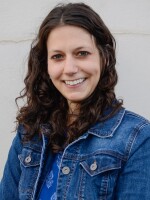On a recent morning, Celita Flowers, 68, sat on her red leather couch in the Waterloo, Iowa home she’s shared with her husband for the past 35 years. Her black toy poodle, Preston, nestled closely to her side.
Flowers has eye and knee issues. In January, she got sick with COVID and pneumonia, ending up in the hospital for six days.
When she got home, she relied entirely on her husband for support.
“He had to help me to the bed. I couldn't get into bed by myself. I was really too weak to walk,” she said.
But it was a lot for her husband, who works full-time.
A friend connected Flowers with Hannah Thomas, an aging specialist with the Northeast Iowa Area Agency on Aging. The group runs Iowa’s Return to Community program, which pairs social workers like Thomas with vulnerable seniors who have had recent hospitalizations –– or are at risk of being hospitalized –– for 90 days.
“We asked a whole bunch of questions about what [Flowers] can do, what she needs help with,” Thomas said. “Would meals be more beneficial? Would someone to help with bathing be more beneficial?”
Support like the one Thomas and her group offer aims to keep older adults safe at home and out of the hospital.
Studies show that when older adults like Flowers are hospitalized for an injury or illness, they’re at risk for –– what some researchers call –– hospital-acquired disability, which is when seniors leave the hospital and increasingly struggle with daily living activities.
Thomas and Flowers ultimately decided she would best benefit from housekeeping services. Flowers likes to keep her house meticulously clean. The cleaner made Flowers feel much more comfortable in her home.
“She gets down there with a rag and cleans the floors, like I clean the floors,” she said. “She doesn't use a mop. She does wonderful.”
The downward spiral
With a hospital-acquired disability, many risk cycling back in and out of the emergency room, which could eventually lead them into pricey nursing home care involuntarily or even contribute to their death.
This is a growing concern as estimates show more than one in five Americans will be over the age of 65 by 2030.
“The mental health goes down. The physical health goes down. You just start to kind of spiral and snowball,” said Cara Ferch, the regional director of the Northeast Iowa Area Agency on Aging, a nonprofit that works with the state of Iowa to run Return to Community.
The program’s goal is to break that downward spiral before it begins and prevent seniors from going into institutionalized care when they may not need it, Ferch said.
The percentage of nursing home residents who are considered “low care,” or require limited assistance, is high in many Midwestern states, according to a report by the UnitedHealth Foundation. They range from 10.5% in Indiana to 31.3% in Missouri. For Iowa, it’s 20.7%.
But aside from improving seniors’ health, advocates say programs like Return to Community could save a lot of money.
A cost estimate by University of Iowa researchers found seniors on Return to Community would save an average of $15,274 on health care services over a 10-year period.
It could also save the state money by potentially reducing the number of people who will need to use Medicaid to pay for expensive nursing home care, Ferch said.
“If we can pay $600 a month for them to stay in their home, versus $5,000 to $6,000 a month for them to stay in the facility, again, it's just a win-win for everybody,” she said.
Funding can be a challenge
Iowa isn’t the only state that’s starting to look at more community-based support for seniors.
The concept behind Iowa’s Return to Community program is heavily borrowed from a program with the same name in Minnesota. Indiana University runs GRACE Team Care serving frail older adults with complex health needs.
But finding long term funding for these community-based programs can be a challenge.
Iowa’s Return to Community is a pilot program that’s been running for five years. Its future still remains uncertain.
For the last fiscal year, the program received $850,000 from the state. It has served 1,204 Iowans between 2019 and 2022, according to state reports.
Officials said they’ve approached hospital systems and insurance companies to find sustainable long-term funding, pointing to evidence that suggests this kind of program could help their bottom line, but they’re hesitant to sign on.
“It's just kind of new and insurance companies and hospitals are all risk averse entities. So, you know, they kind of want to see other people do it first a little bit,” said Kent Ohms, community living director with the Iowa Department of Health and Human Services Division of Aging and Disability Services.
At the same time, Ohms said he’s given presentations to lawmakers on the program’s benefits, but so far Iowa’s budget-conscious Republican majority legislature hasn’t yet taken any initiative to make the program into a permanent statewide service.
Side Effects Public Media is a health reporting collaboration based at WFYI in Indianapolis. We partner with NPR stations across the Midwest and surrounding areas — including KBIA and KCUR in Missouri, Iowa Public Radio, Ideastream in Ohio and WFPL in Kentucky.



